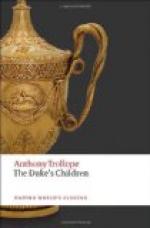He went to breakfast with Tregear’s letter in his pocket, and was then gracious to Mrs Finn, and tender to his daughter. ’When do you go, papa?’ Mary asked.
’I shall take the 11.45 train. I have ordered the carriage at a quarter before eleven.’
‘May I go to the train, papa?’
‘Certainly; I shall be delighted.’
‘Papa!’ Mary said as soon as she found herself seated beside her father in the carriage.
‘My dear.’
‘Oh, papa!’ and she threw herself on to his breast. He put his arm round her and kissed her,—as he would have had so much delight in doing, as he would have done so often before, had there not been this ground of discord. She was very sweet to him. It had never seemed to him that she had disgraced herself by loving Tregear—but that a great misfortune had fallen upon her. Silverbridge when he had gone into a racing partnership with Tifto, and Gerald when he had played for money which he did not possess, had—degraded themselves in his estimation. He would not have used such a word; but it was his feeling. They were less noble, less pure than they might have been, had they kept themselves free from such stain. But this girl,—whether she should live and fade by his side, or whether she should give her hand to some fitting noble suitor,—or even though she might at last become the wife of this man who loved her, would always have been pure. It was sweet to him to have something to caress. Now in the solitude of his life, as years were coming on him, he felt how necessary it was that he should have someone who would love him. Since his wife had left him he had been debarred from these caresses, by the necessity of showing his antagonism to her dearest wishes. It had been his duty to be stern. In all his words to his daughter he had been governed by a conviction that he never ought to allow the duty of separating her from her lover to be absent from his mind. He was not prepared to acknowledge that that duty had ceased;—but yet there had crept over him a feeling that as he was half conquered, why should he not seek some recompense in his daughter’s love. ‘Papa,’ she said, ‘you do not hate me?’
‘Hate you, my darling!’
’Because I am disobedient. Oh, papa, I cannot help it. He should not have come. He should not have been let to come.’ He had not a word to say to her. He could not as yet bring himself to tell her,—that it should be as she desired. Much less could he now argue with her as to the impossibility of such a marriage as he had done on former occasions when the matter had been discussed. He could only press his arm tightly round her waist, and be silent. ’It cannot be altered now, papa. Look at me. Tell me that you love me.’
‘Have you doubted my love?’
’No, papa,—but I would do anything to make you happy; anything that I could do. Papa, you do not want me to marry Lord Popplecourt?’




